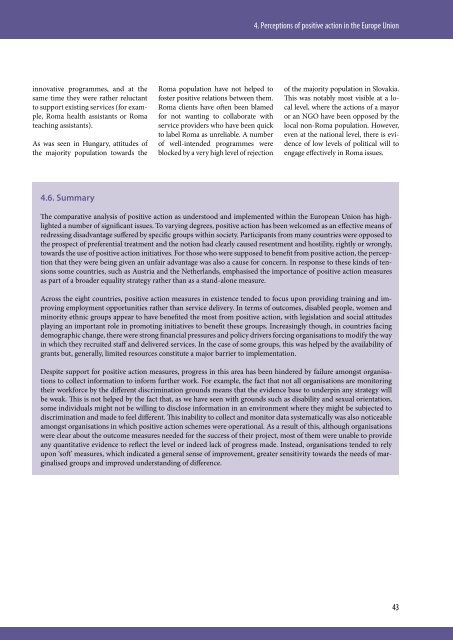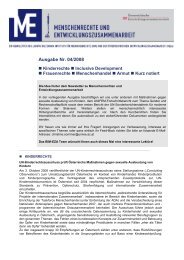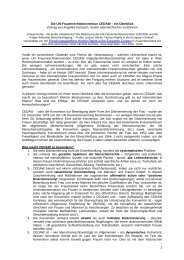International perspectives on positive action measures - European ...
International perspectives on positive action measures - European ...
International perspectives on positive action measures - European ...
You also want an ePaper? Increase the reach of your titles
YUMPU automatically turns print PDFs into web optimized ePapers that Google loves.
innovative programmes, and at the<br />
same time they were rather reluctant<br />
to support existing services (for example,<br />
Roma health assistants or Roma<br />
teaching assistants).<br />
As was seen in Hungary, attitudes of<br />
the majority populati<strong>on</strong> towards the<br />
4.6. Summary<br />
Roma populati<strong>on</strong> have not helped to<br />
foster <strong>positive</strong> relati<strong>on</strong>s between them.<br />
Roma clients have often been blamed<br />
for not wanting to collaborate with<br />
service providers who have been quick<br />
to label Roma as unreliable. A number<br />
of well-intended programmes were<br />
blocked by a very high level of rejecti<strong>on</strong><br />
4. Percepti<strong>on</strong>s of <strong>positive</strong> acti<strong>on</strong> in the Europe Uni<strong>on</strong><br />
of the majority populati<strong>on</strong> in Slovakia.<br />
This was notably most visible at a local<br />
level, where the acti<strong>on</strong>s of a mayor<br />
or an NGO have been opposed by the<br />
local n<strong>on</strong>-Roma populati<strong>on</strong>. However,<br />
even at the nati<strong>on</strong>al level, there is evidence<br />
of low levels of political will to<br />
engage effectively in Roma issues.<br />
The comparative analysis of <strong>positive</strong> acti<strong>on</strong> as understood and implemented within the <strong>European</strong> Uni<strong>on</strong> has highlighted<br />
a number of significant issues. To varying degrees, <strong>positive</strong> acti<strong>on</strong> has been welcomed as an effective means of<br />
redressing disadvantage suffered by specific groups within society. Participants from many countries were opposed to<br />
the prospect of preferential treatment and the noti<strong>on</strong> had clearly caused resentment and hostility, rightly or wr<strong>on</strong>gly,<br />
towards the use of <strong>positive</strong> acti<strong>on</strong> initiatives. For those who were supposed to benefit from <strong>positive</strong> acti<strong>on</strong>, the percepti<strong>on</strong><br />
that they were being given an unfair advantage was also a cause for c<strong>on</strong>cern. In resp<strong>on</strong>se to these kinds of tensi<strong>on</strong>s<br />
some countries, such as Austria and the Netherlands, emphasised the importance of <strong>positive</strong> acti<strong>on</strong> <strong>measures</strong><br />
as part of a broader equality strategy rather than as a stand-al<strong>on</strong>e measure.<br />
Across the eight countries, <strong>positive</strong> acti<strong>on</strong> <strong>measures</strong> in existence tended to focus up<strong>on</strong> providing training and improving<br />
employment opportunities rather than service delivery. In terms of outcomes, disabled people, women and<br />
minority ethnic groups appear to have benefited the most from <strong>positive</strong> acti<strong>on</strong>, with legislati<strong>on</strong> and social attitudes<br />
playing an important role in promoting initiatives to benefit these groups. Increasingly though, in countries facing<br />
demographic change, there were str<strong>on</strong>g financial pressures and policy drivers forcing organisati<strong>on</strong>s to modify the way<br />
in which they recruited staff and delivered services. In the case of some groups, this was helped by the availability of<br />
grants but, generally, limited resources c<strong>on</strong>stitute a major barrier to implementati<strong>on</strong>.<br />
Despite support for <strong>positive</strong> acti<strong>on</strong> <strong>measures</strong>, progress in this area has been hindered by failure am<strong>on</strong>gst organisati<strong>on</strong>s<br />
to collect informati<strong>on</strong> to inform further work. For example, the fact that not all organisati<strong>on</strong>s are m<strong>on</strong>itoring<br />
their workforce by the different discriminati<strong>on</strong> grounds means that the evidence base to underpin any strategy will<br />
be weak. This is not helped by the fact that, as we have seen with grounds such as disability and sexual orientati<strong>on</strong>,<br />
some individuals might not be willing to disclose informati<strong>on</strong> in an envir<strong>on</strong>ment where they might be subjected to<br />
discriminati<strong>on</strong> and made to feel different. This inability to collect and m<strong>on</strong>itor data systematically was also noticeable<br />
am<strong>on</strong>gst organisati<strong>on</strong>s in which <strong>positive</strong> acti<strong>on</strong> schemes were operati<strong>on</strong>al. As a result of this, although organisati<strong>on</strong>s<br />
were clear about the outcome <strong>measures</strong> needed for the success of their project, most of them were unable to provide<br />
any quantitative evidence to reflect the level or indeed lack of progress made. Instead, organisati<strong>on</strong>s tended to rely<br />
up<strong>on</strong> ‘soft’ <strong>measures</strong>, which indicated a general sense of improvement, greater sensitivity towards the needs of marginalised<br />
groups and improved understanding of difference.<br />
43

















